Dixie Betrayed (54 page)
Authors: David J. Eicher

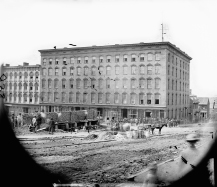
The Spotswood Hotel, newly built when the war commenced, was Richmond’s place to see and be seen. Jefferson Davis and his family lived here until a home could be found, as did cabinet members and many congressmen and senators. After the Confederate victory of First Manassas, Jefferson Davis made a stirring speech from a window of the hotel.
Library of Congress
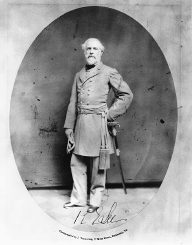
The consummate Virginian, Robert E. Lee opposed secession until his own state left the Union. He began the war inauspiciously, serving as a general in western Virginia and in South Carolina and then as adviser to the president in Richmond before Joseph E. Johnston’s wounding thrust him into command of the Army of Northern Virginia. Lee’s performance in the field was legendary; distrustful of diluting his own power, Davis resisted naming Lee general-in-chief until near war’s end, when it was too late to make any difference.
Cook Collection, Valentine Museum
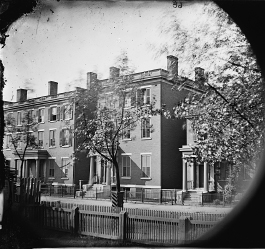
The Lee Home at 707 East Franklin Street in Richmond housed Mary Custis Lee and various family members from early 1864 to the end of the war. Lee arrived at the house after Appomattox and stayed until September 1865, when the family moved to Lexington. This image is from 1865.
Library of Congress
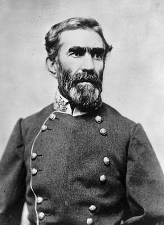
Braxton Bragg, one of six full generals in the Confederacy, survived scathing attacks on his generalship due to his friendship with Jefferson Davis. A North Carolinian, he fought at Shiloh, invaded Kentucky, and clashed with Yankees at Stones River and Chickamauga and Chattanooga. Following harsh criticism, he was summoned to Richmond to serve as Davis’s military adviser during the last year of the war. Davis’s loyalty to his friends sometimes caused severe damage, as was the case with Bragg.
Library of Congress
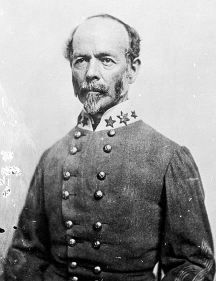
Like Bragg, Joseph E. Johnston suffers from a record stained with frequent criticism. This Virginia general, another close friend of Lee’s, commanded the Confederate Army of Northern Virginia before being wounded at Seven Pines. However, in the first weeks of war, he had already become outraged at Jefferson Davis for ranking him lower than he believed just. He had a testy relationship with the administration throughout his whole career — from First Manassas to his surrender to Sherman at Durham Station, North Carolina.
National Archives and Records Administration
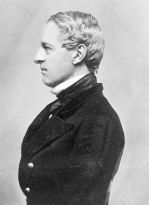
The senior general officer of the Confederacy, Samuel Cooper served as adjutant general and inspector general and was characterized by War Department insiders as a “glorified clerk.” He never wore a uniform, seemed dull and was distracted by trivial matters, and lived in a cramped rooming house in Richmond, his family often away. He was a paperwork general whom two famous Richmond diarists both thought simply “incompetent,” but Davis could trust him, and so he stayed throughout the whole war.
Library of Congress
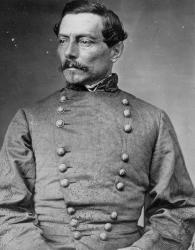
The first great hero of the war, P. G. T. Beauregard drove the Yankees from Fort Sumter and helped to retain the field at First Manassas. Relations between Beauregard and Davis soured because the general wanted an independent command, and Beauregard was subordinate to others. He fought all over the western theater and was never happy with his treatment by the president.
National Archives and Records Administration
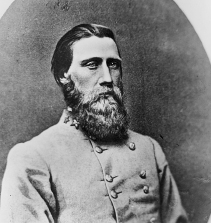
A Kentuckian who relocated to Texas, John Bell Hood was known as an aggressive fighter from the early days of the war. He was also a close friend of Senator Louis T. Wigfall, who looked after him. Hood rose through the command ranks and accompanied his Texas Brigade as it screamed the rebel yell into attacks. He lost the use of his left arm at Gettysburg and lost his right leg at Chickamauga. After leading a foolhardy campaign in Tennessee late in the war, he was forgotten by Davis.
Library of Congress
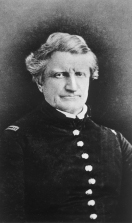
Son of a brigadier general of the War of 1812, Marylander John H. Winder was a harsh man who drew a difficult assignment as provost marshal of Richmond. As such, Winder tried to keep law and order in a town that tripled in size over the course of the war. He was hated by Richmonders for trying to restrict too much and finally was sent to Anderson-ville Prison in Georgia to clean it up, but couldn’t. He died in 1865, before Federal authorities could capture him, thus saving a trial and hanging by the Yankees for mistreating Union prisoners.
Library of Congress
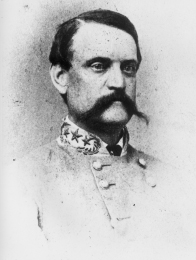
At times Kentuckian John C. Breckinridge was the only politician in the South who seemed to keep his head. A former U.S. vice president under James Buchanan, Breckinridge became a general and fought at Shiloh, Vicksburg, Chickamauga, and Chattanooga. Moving east, he checked the Yankees at Cold Harbor before returning to Richmond as the Confederacy collapsed, in February 1865. As the last Confederate secretary of war, Breckinridge judged the situation hopeless, so tired from the struggle he termed himself “an extinct volcano.”
National Archives and Records Administration
